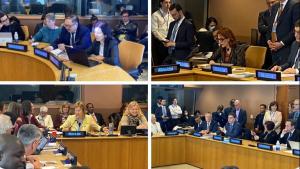
Italy and Kazakhstan have committed to reinforce action to uphold human rights to water and sanitation for all by joining the UNECE/WHO Europe Protocol on Water and Health, at the milestone UN Water Conference in New York.
Hungary, as Chair of the Protocol, also shared its commitment to help more countries in the pan-European region to join and implement this legally binding instrument. With 27 states already Party to the Protocol, and with over 40 countries working in its framework, its expanded membership would not only drive national action on water, sanitation, hygiene and health in the pan-European region, but also further reinforce the exchange of experience, practical solutions and know-how. Albania also committed to apply a Protocol methodology to assess the situation with equitable access to water and sanitation and map out geographical disparities, affordability of WASH services and access for vulnerable and marginalized groups.
The two UN agencies that service the Protocol, the United Nations Commission for Europe (UNECE) and the WHO Regional Office for Europe, have also submitted a voluntary commitment aimed at driving action on water, sanitation, hygiene and health in the pan-European region through the Protocol. With the support and cooperation of the Protocol Bureau - Finland, France, Germany, Hungary, Luxembourg, Norway, Portugal, Republic of Moldova, Romania, Serbia, Switzerland– the commitment aims for at least 8 additional countries joining the Protocol by 2030, and to support up to 35 countries in the setting of integrated national targets on WASH and health, and scale-up of the Protocol’s tools and guidance material.
These commitments will make up one of the key outcomes of the UN 2023 Water Conference, the Water Action Agenda, which will serve to accelerate the implementation of Sustainable Development Goal 6 on water and sanitation.
A dedicated side event on the Protocol on Water and Health organized by Hungary further promoted the scale-up of practical tools and know-how gained under the instrument, and shed light on the benefits of accession. While the Protocol is a regional instrument, its tools and guidance materials on water, sanitation, hygiene and health are of global relevance and are applicable worldwide.
“The Protocol has been a critical instrument in promoting access to safe drinking water and sanitation for all in the Pan-European region; its target-setting obligation provides a framework for countries to develop their national water and health strategies and has encouraged regional and international collaboration in almost 40 countries. The Protocol can serve as a catalyst for increased action and inspire efforts worldwide”, stated UNECE Executive Secretary Olga Algayerova.
Globally, 2 billion people lack safely managed drinking water services, and 3.6 billion lack safely managed sanitation services. To achieve universal safely managed services, historical rates of progress would need to quadruple, according to WHO. Despite important achievements under the Protocol in the Pan-European region, significant challenges remain, as 16 million people still lack access to basic drinking water and 29 million do not have basic access to sanitation services. Climate change is posing significant additional threats to access to water, sanitation and hygiene (WASH) worldwide.
The Protocol on Water and Health supports countries to protect human health through sustainable water management and by preventing and reducing water-related diseases. The Protocol has a special emphasis on human rights, through equitable access to water and sanitation for all, including vulnerable and marginalized groups.